How to Sell Music on Shopify in 2026

Music is one of the oldest art forms, and it is constantly evolving. Whether you are an up-and-coming independent musician or simply have a passion for making music, promoting it digitally is a surefire way to get your name out there. To do this, a music website is the key.
Among a sea of options, Shopify has proven itself time and time again to be a top-notch host platform. If you want to learn how to sell music on Shopify, then you have come to the right place. Keep reading to discover what this versatile platform can do for your music business.
Shopify for Musicians: An Overview
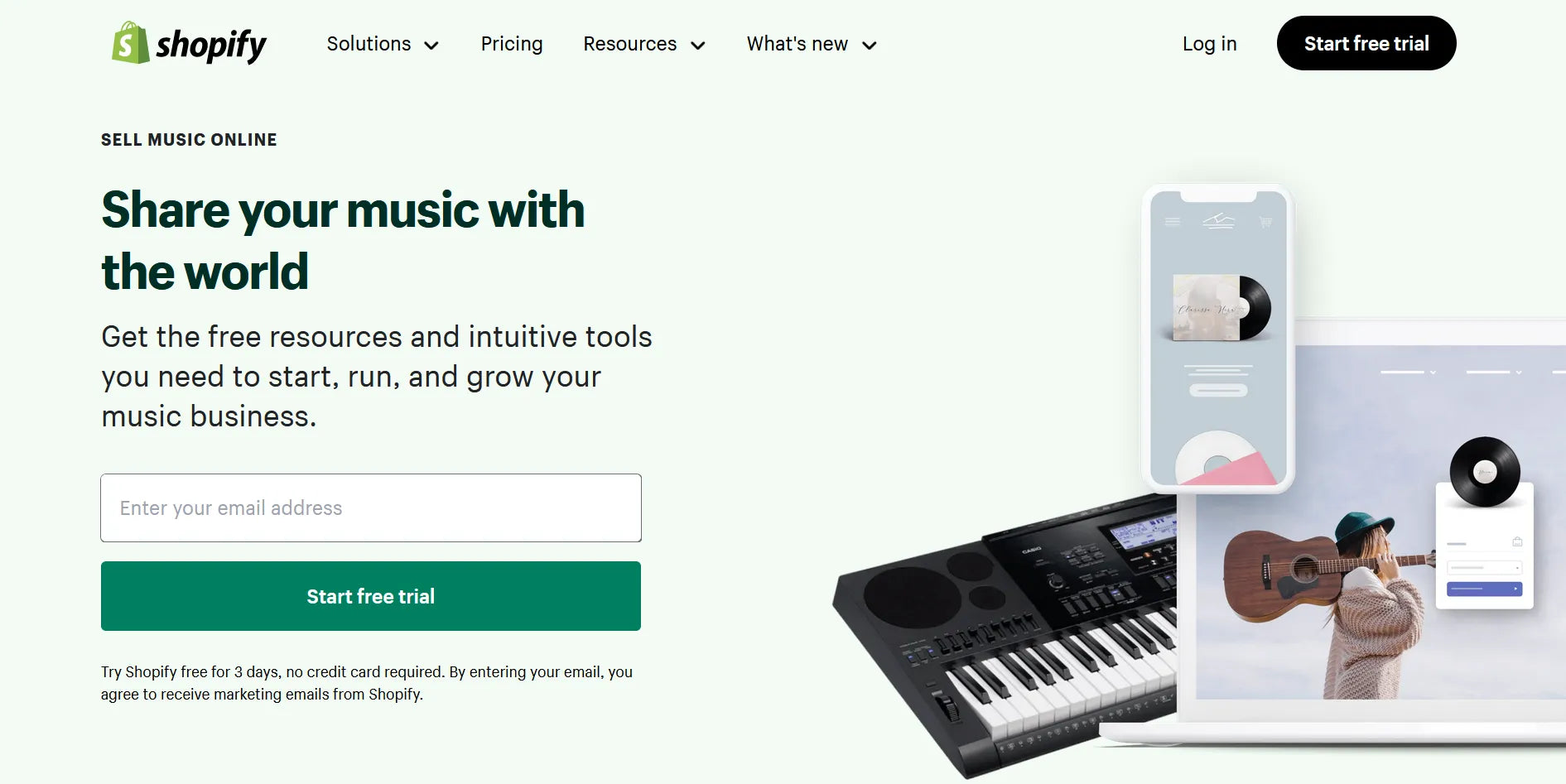
Share your passion for music using Shopify’s assistance.
Maintaining a digital music storefront is a meticulous task that requires your invested time and effort, that is why Shopify makes it easy for sellers to begin their journeys without any hassle. Let’s walk through what it takes for you to sell music digitally.
Learn more: Shopify Tutorial: Everything For Success
What makes Shopify a good platform to sell music on?
Shopify is home to many product niches, from food and beverage to pet stores. If you’ve got an idea, most likely it can be sold on this platform.
Still hesitating? Let’s look at the benefits of Shopify for musicians.
Affordability
Shopify requires little to no upfront cost to set up. With different pricing plans for different needs, you can start small, and then gradually upgrade your business as it grows.
For instance, the Basic package is the most suitable for solo entrepreneurs, AKA indie musicians who are looking to test the waters. With a $19 price tag per month, you are free to use all the necessities to build your store from scratch. When putting this and opening up a brick-and-mortar on the scale, going digital steals the show.
Start Your Online Business with Shopify–Only $1
Shopify Plus Pricing: Everything You Need To Know Before Upgrade
Intuitive features
Not all business owners are adept web developers. Unless you are a jack of all trades, your skillset is often reserved for the musical department. This is when Shopify’s user-friendly features come in.
Whether you plan on selling instruments, organizing events, or offering music courses - there are different settings that can make your work sing (no pun intended). Tweaking and editing details is also less time-consuming, as most of the settings require little to no coding knowledge.
Learn more: Ecommerce UX: Best Practices For 2026
Free resources
With Shopify as the host, you are presented with extensive resources to complement your store. Blog posts, webinars, tutorial videos, 24/7 chat support, etc. are all useful amenities that boost your business’s performance.
Instead of maintaining a standalone website, you are supported by an entire ecosystem with smaller communities that cater to your niche. This is especially helpful for aspiring artists who want to build a solid brand for themselves without spending a lot of time and effort.

What kind of music sells best?
This question does not have a definite answer, but there is a certain benchmark that helps novice musicians pinpoint their paths to success more effectively.
The latest Statista’s Consumer Insights survey reveals that Rock/Alternative/Indie music takes the number one spot for America’s favorite music genre, which is closely followed by Country and Pop. If you are seeking a specific genre to pursue, it’s advised to look at current trends to know which direction to go towards.
Alternatively, you can lean into making beats and stock music. With the boom of creating content online, creators and influencers are constantly looking for new royalty-free music to complement their content.
How to create a music store on Shopify
As long as you have a solid idea, creating a music store on Shopify can be done in 3 simple steps.
Step 1. Decide on a product
Picking a product idea is not only in regard to music genres as we have mentioned above. Since music is a flexible and marketable industry, there is no shortage of other niches that you can tap into.
Music albums, merchandise, vinyl, courses, live stream concerts, and instruments are all great product niches that help you monetize music. Utilizing simple and convenient business models like a Print-on-Demand service gives you the liberty to offer a wider array of exclusive products to your customers.
Learn more: 24 Best One Product Store Ideas
Step 2. Set up your Shopify store
This process is uniform for any store owner, sans matter the industry. Similar to building a physical store, it is best to start from the ground up. Picking a domain name, theme, templates, and fonts is all crucial to hitting the ground running.
If you do not have any pre-existing web-building knowledge, no sweat. Shopify’s features are automated and streamlined so that even the most inexperienced can build a website from scratch.
Pro tip: explore the Shopify app store for third-party apps that help kickstart your storefront quicker. I.e. GemPages is designed to zhuzh up your website with stunning web pages. Besides, GemPages Academy - A knowledge hub - provides all information about page building and achieving overall eCommerce success, from Shopify Courses to CRO On Shopify, or Shopify Apps - That's worth a try!
Step 3. Promote your music store
Ever come across an “I didn’t know I needed this” product? That is solid proof of the importance of marketing.
Once you have already established a polished website, social media marketing is the next step to take. Apart from creating a cohesive identity across different platforms, running ads on Facebook, Instagram, X, or Reddit is an effective marketing tactic to generate traffic to your store.
If you are willing to invest, making a music video will give you more promotional material and experience to learn how to make money as an independent artist.
How to Promote Shopify Store: 15 Solid Strategies + Inspiring Examples
Shopify Music Store Examples: Learn from the Professionals
Sometimes all we need are visual examples to put it into gear. Let’s take a peek at how these famous artists and singers utilized Shopify to build their high-converting music stores.
1. Beyoncé
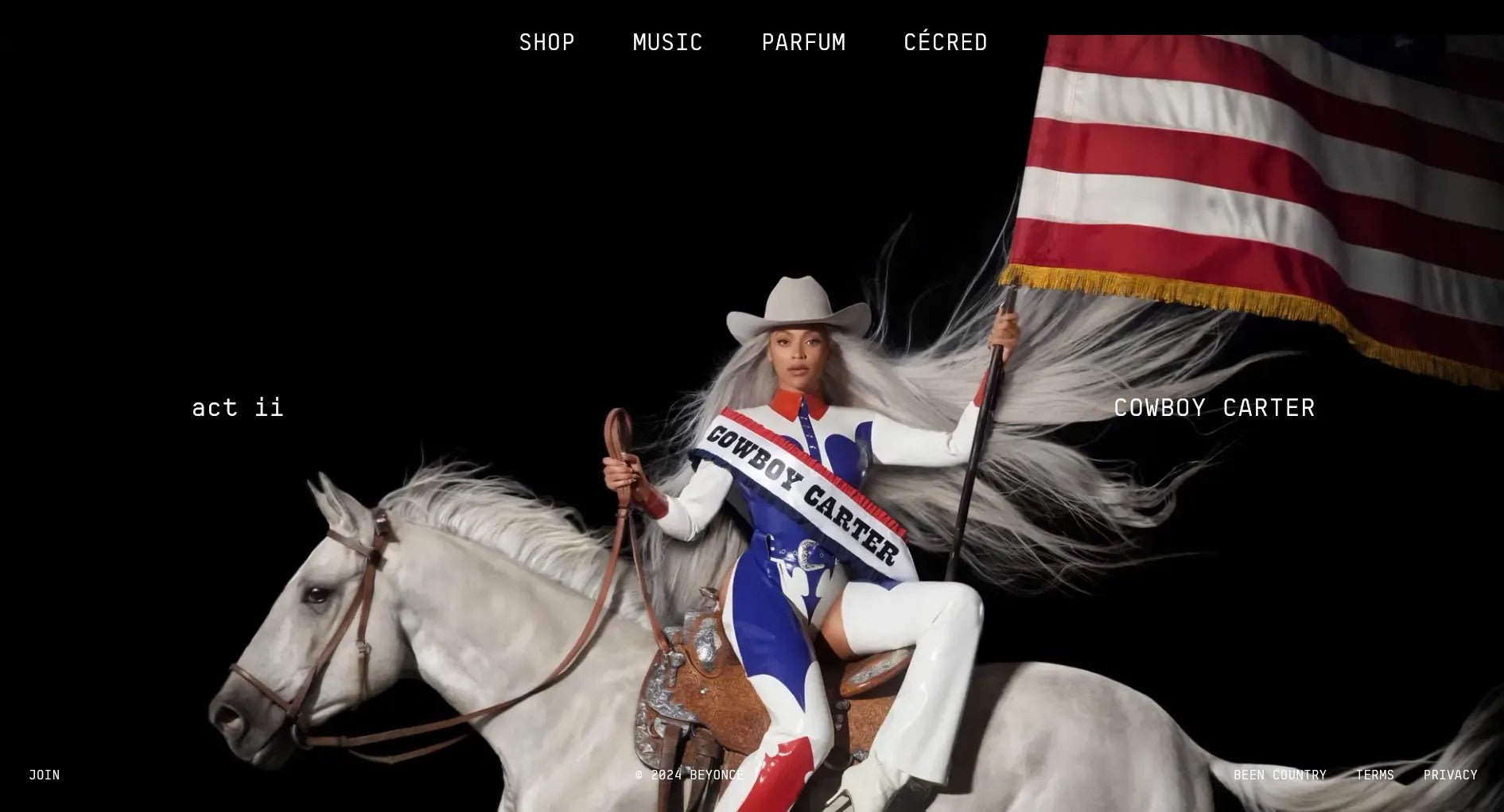
Beyonce uses Shopify as a host platform for her official music store.
The Queen Bee is one of a handful of artists in the music industry that rounds up a crowd no matter what she does. Thus, it is understandable that her website contains everything about her latest music to merch and skincare line to keep the loyal fanbase posted on her every move. For a well-established performer like Beyoncé, the website is kept minimalist and in tune with the current era of her music. With no other than the artist as the main visual, the layout possesses a modern and aesthetic feel. Visitors will have no problem navigating the store and purchase with this outstanding website.
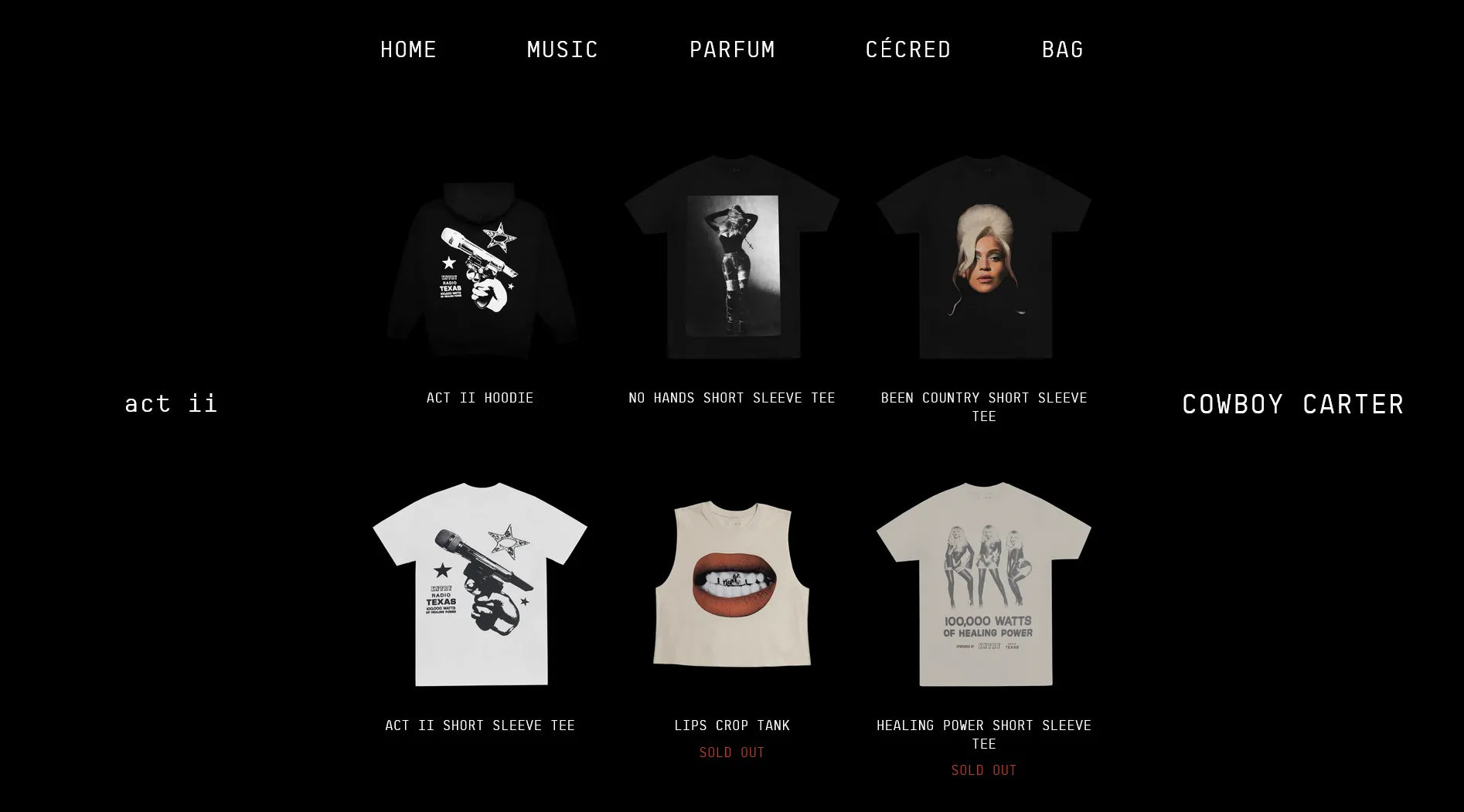
Browse and purchase merch through a simple interface on Beyoncé’s website.
2. Lady Gaga
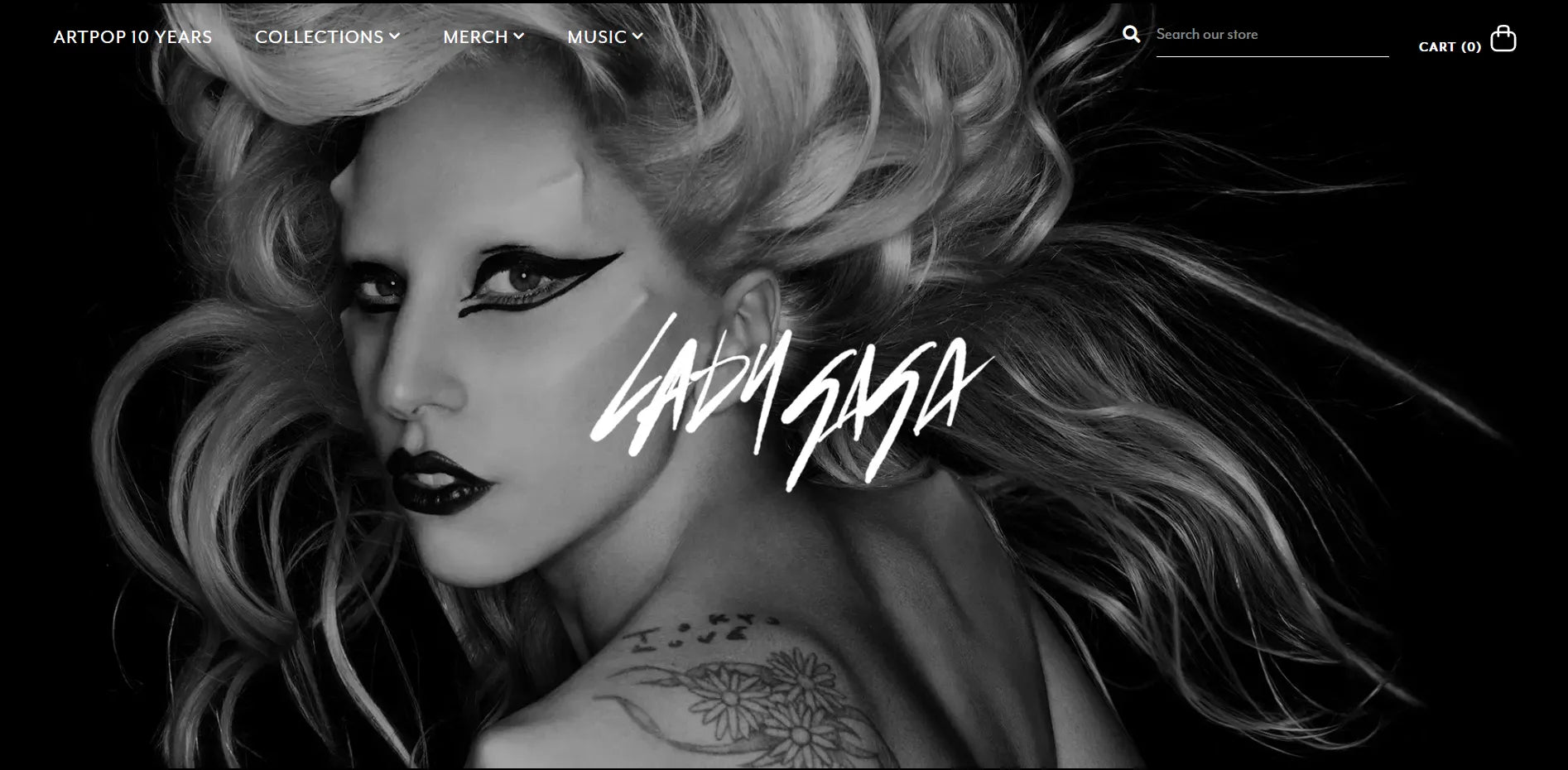
Find everything about Lady Gaga’s latest music project on the singer’s official music store.
Lady Gaga is more than a talented singer with a unique style. She is known to be an avid LGBTQIA+ activist, actress, and businesswoman. Her whimsical fashion sense and powerful voice have made Gaga a worldwide famous artist, and her professional website perfectly reflects her aesthetic.
Embracing a dark tone, the website showcases different eras of Lady Gaga’s music career. The drop-down menu is a classic component for a more intuitive layout. This way, fans can easily hop around from checking out her newly released vinyl and CDs to purchasing t-shirts and tote bags. The store is not only visually striking but also user-friendly and fast-loading.
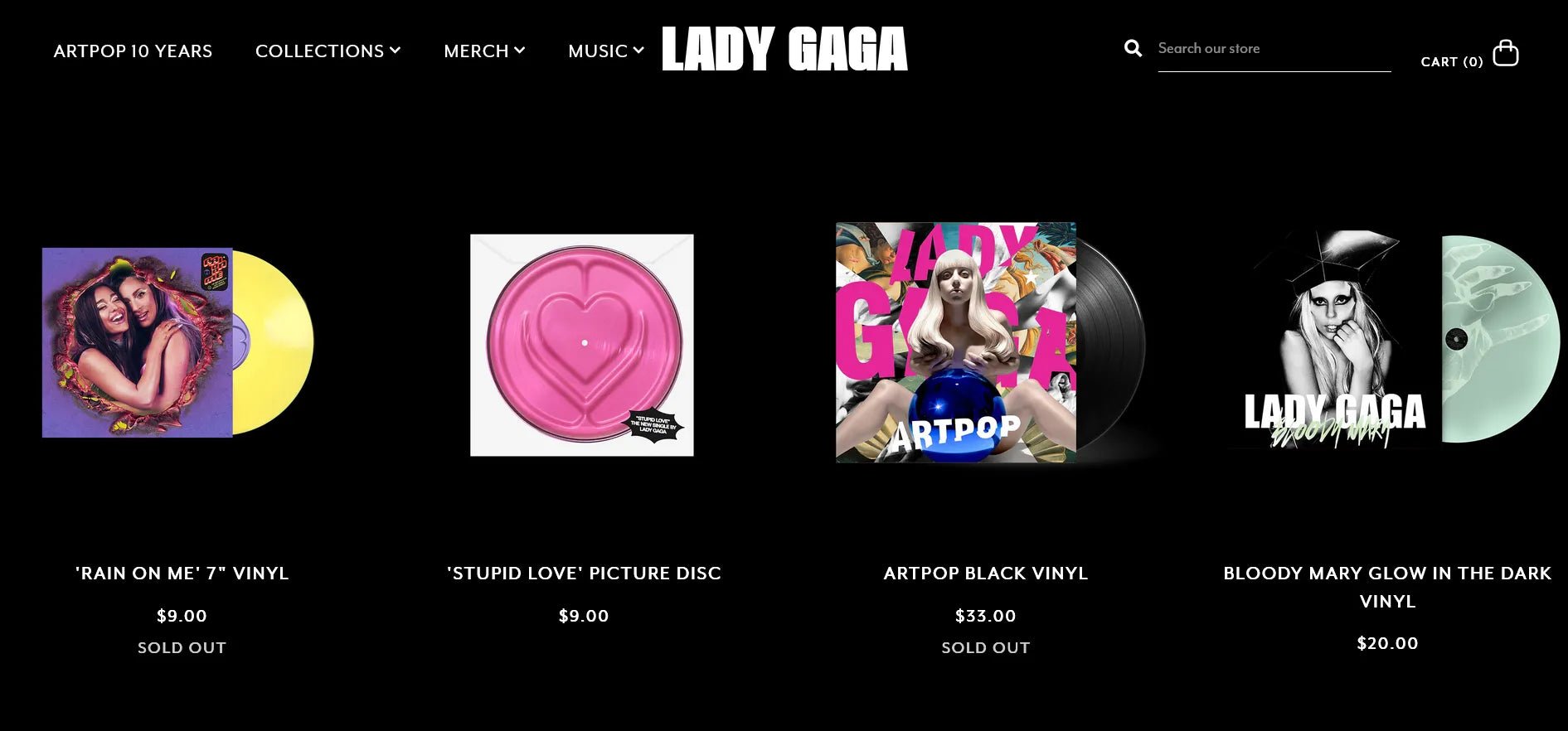
Get your hands on Lady Gaga’s collection of vinyl and CDs via her official store.
3. Dua Lipa
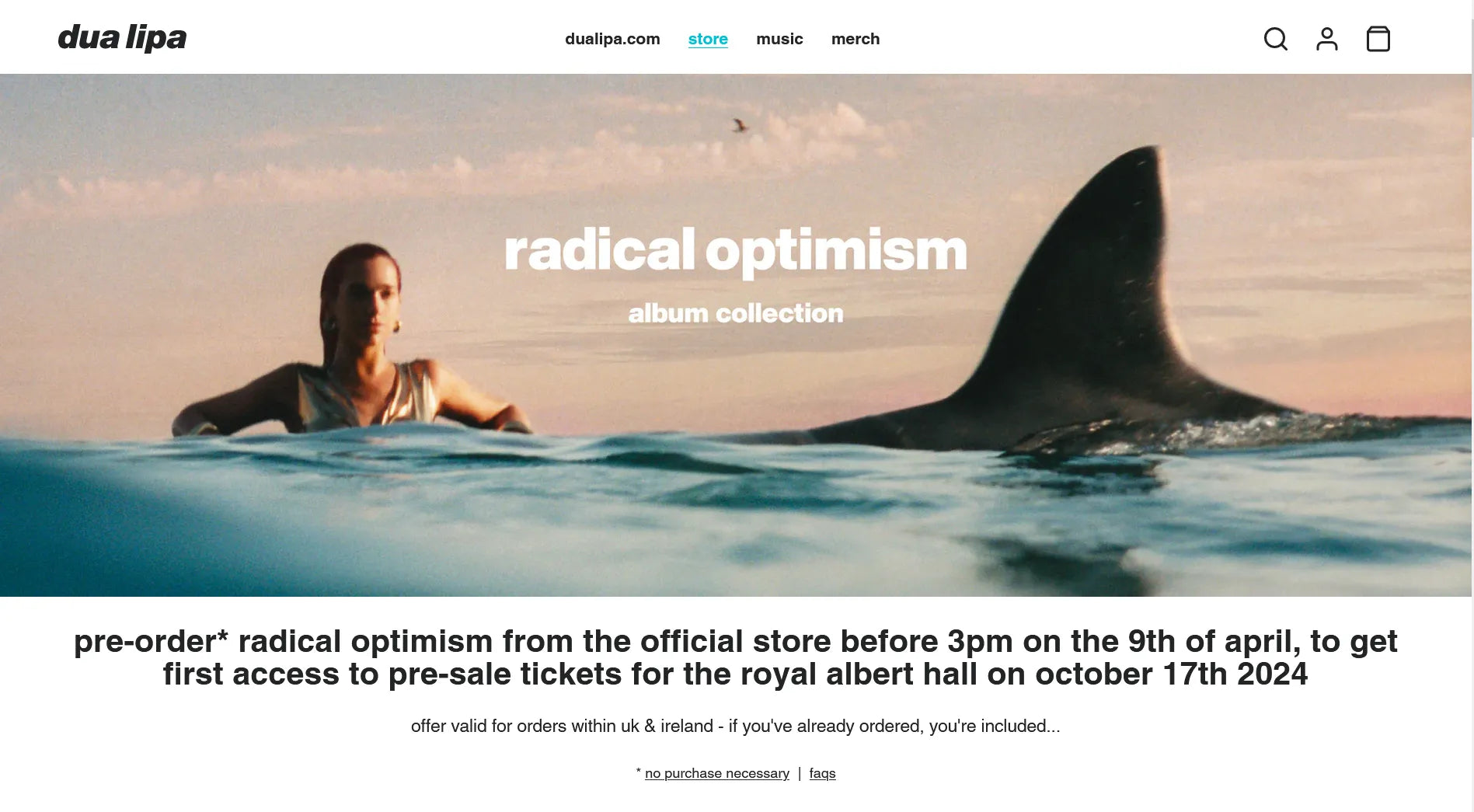
Dua Lipa uses her music store as the official outlet for her music and merch drops.
Dua Lipa has made a name for herself as one of the most recognizable artists from the UK. Her music is dynamic and influential - which can be heard at your local mall or the hippest nightclub in town. This versatile artist has a distinct music style, which translates to her official website well.
At a glance, the layout is chic and clean. The juxtaposition between bold text and light-colored background helps highlight the content of the page. Whether you are familiar with Dua Lipa or not, you can catch her vibes as a singer instantly with this well-thought-out storefront.
Want to purchase a t-shirt or pre-order her anticipated album? The top menu will tell you exactly where to go. This is a textbook example of a less-is-more approach when it comes to web design.
4. Billie Eilish
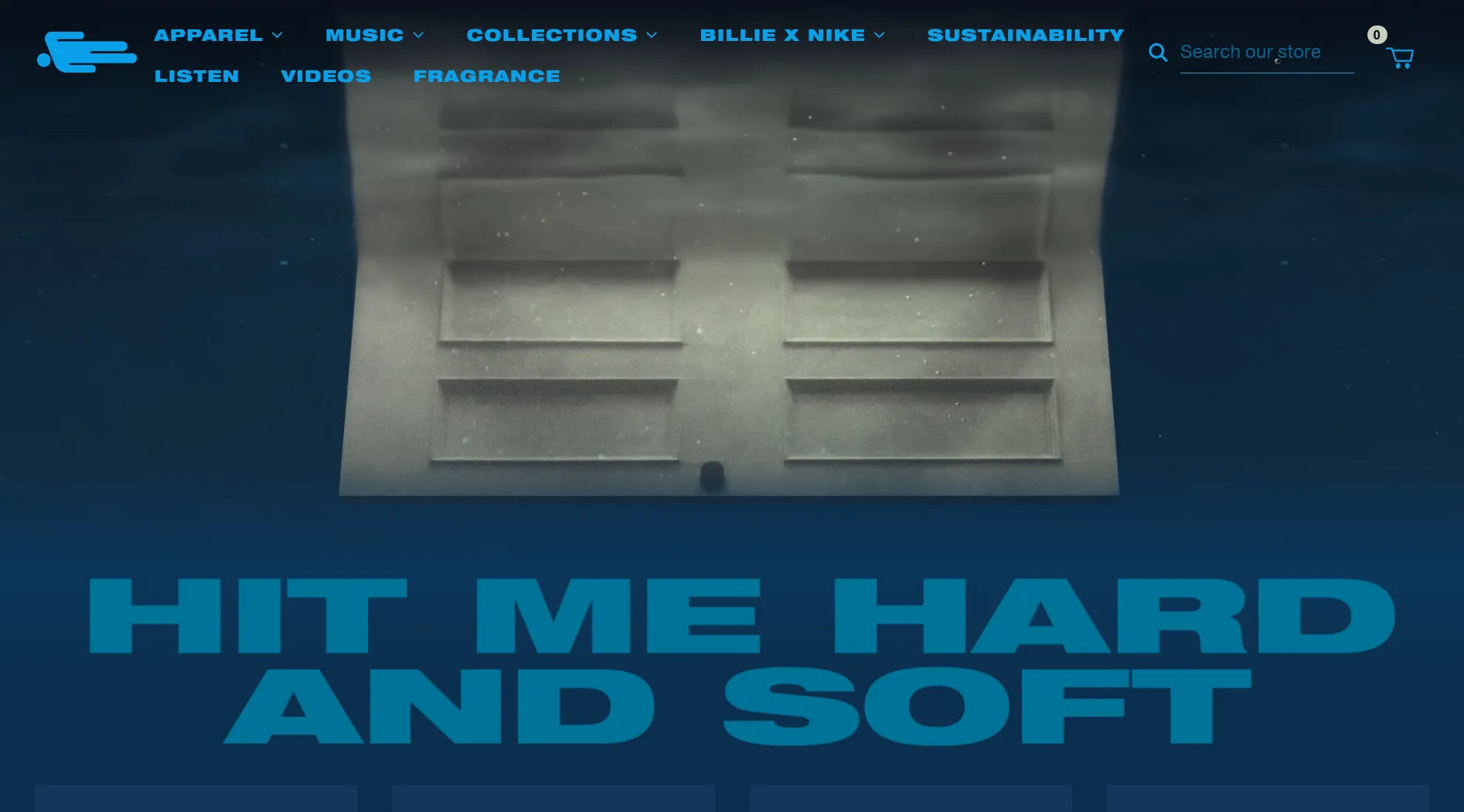
Stay updated with the latest merch and music drops on Billie Eilish’s music store.
Although she just had a breakthrough not long ago, Billie Eilish has managed to become one of America’s all-time favorite singers, especially among Gen Z-ers. For such a recognized reputation, her music store is undoubtedly loaded with all things Billie for the most loyal fans.
The website has had a makeover to promote Billie’s newest album: Hit Me Hard And Soft. The navigation bar contains everything you need to stay in the loop with the singer’s multifaceted career. From the merch, music, and brand collab to fragrance - the website is nothing short of informative and clear. The choice of colors and font are also in tune with the singer’s aesthetic: eccentric and experimental. If your music store possesses the same vibes, Billie Eilish’s website will be an excellent example to follow suit.
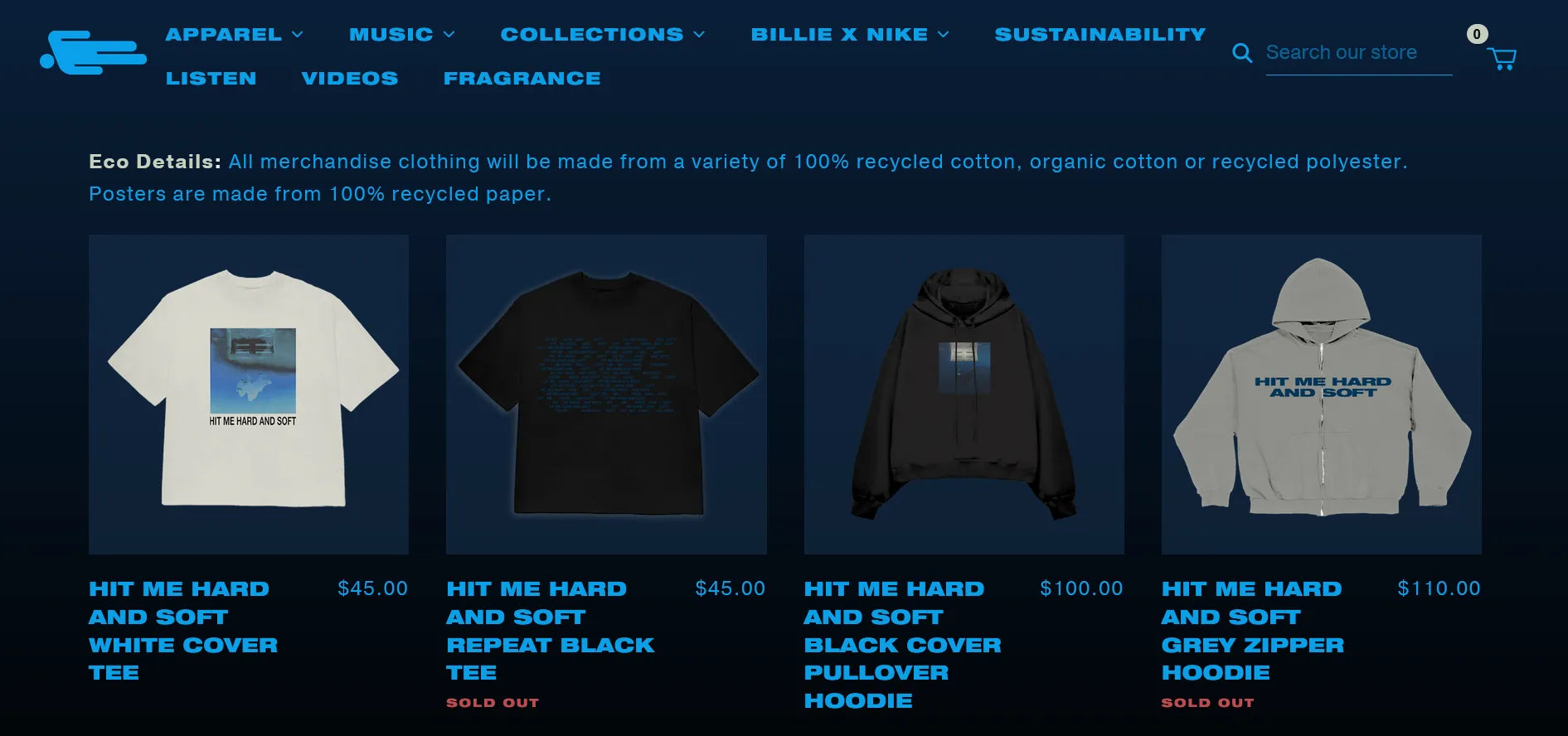
Freshly launched merch can be found on Billie Eilish’s music store.
5. Cavetown
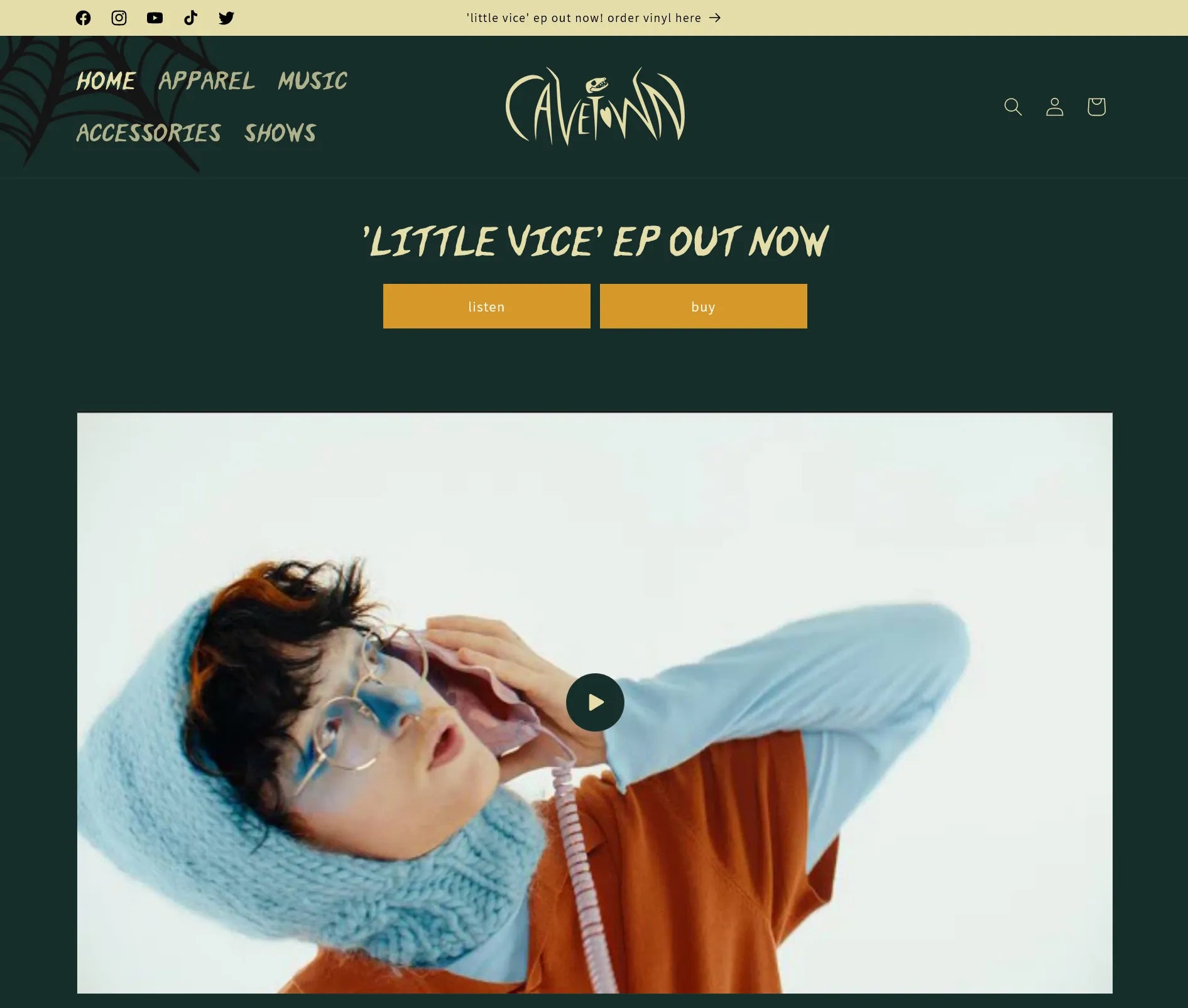
Cavetown’s music store showcases his newest releases and everything fans want to know about this talented artist.
If the name Cavetown does not ring a bell, you are in for a treat. This multitalented singer-songwriter makes music that could put your mind at ease in a second.
Known for his quirky and hip music style, Cavetown has built a website that embodies his spirit perfectly. The earth-toned color palette makes the product listings stand out, while the off-the-wall font captures visitor’s attention at first sight.
The top menu is neatly positioned so that customers are properly guided. Simply click on Apparel or Accessories to buy the coolest merch, or choose Music or Shows to purchase music and tickets to his upcoming shows near you.
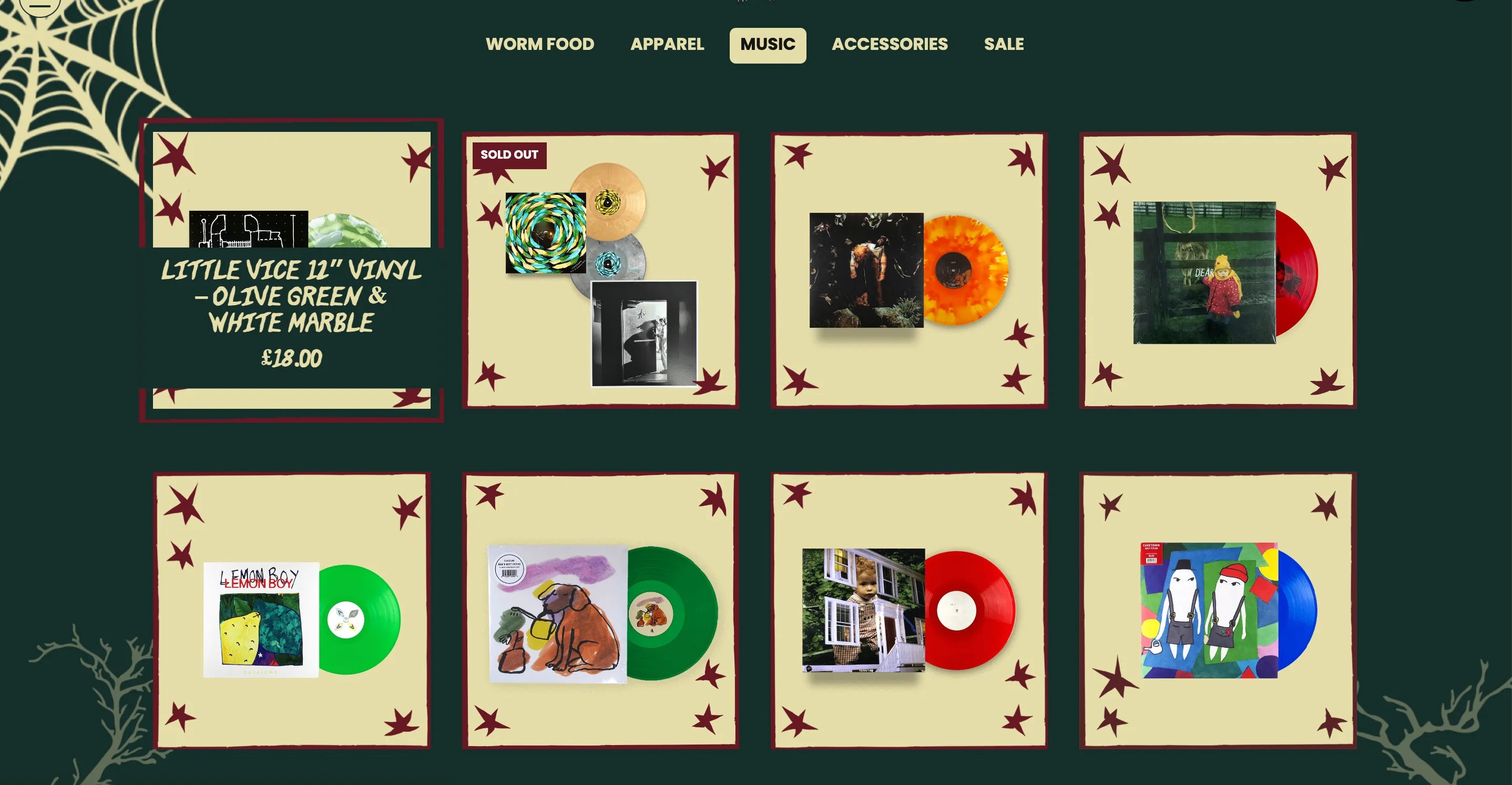
Buy vinyl and CDs with a few clicks through Cavetown’s music store.
6. Yung Gravy
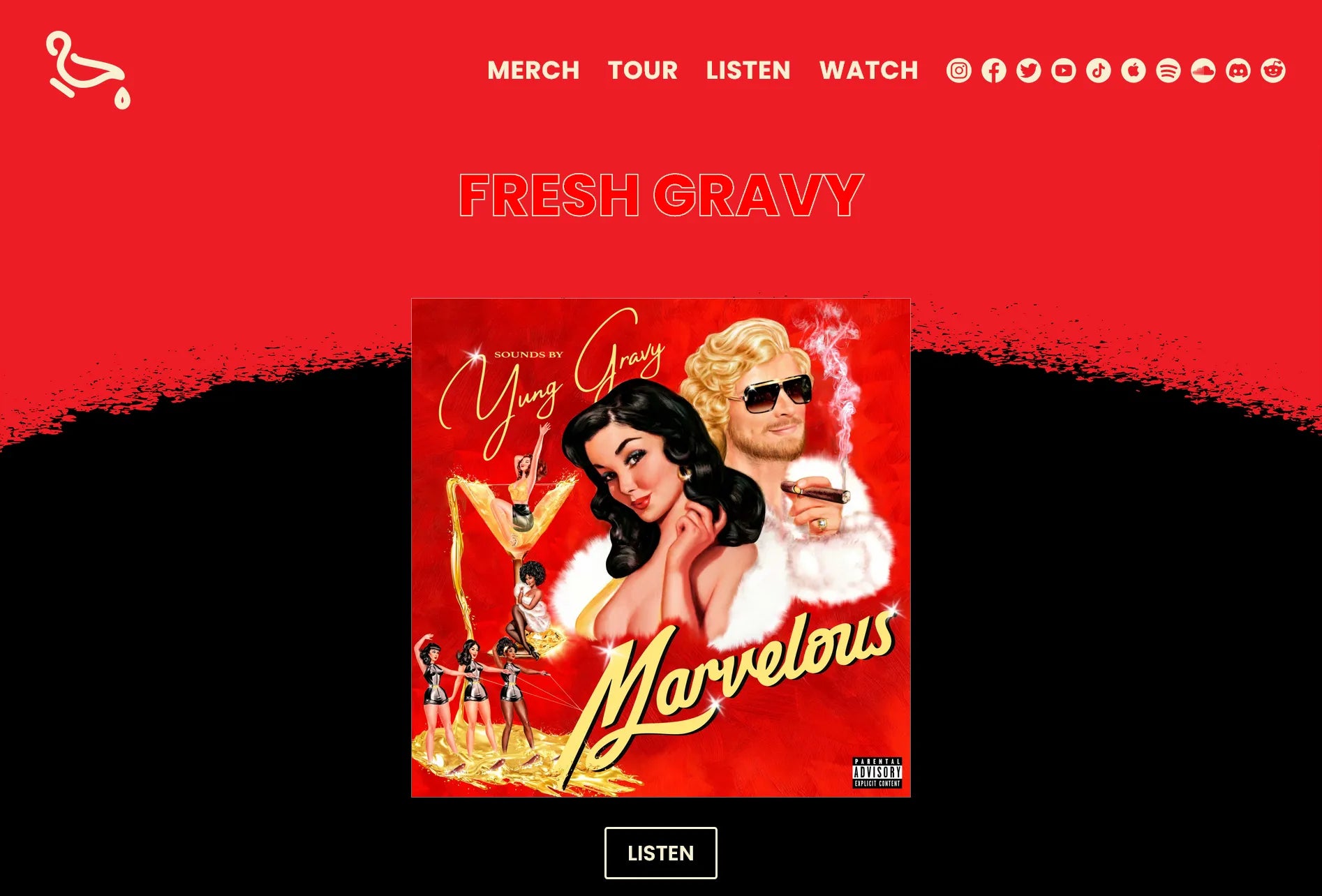
The latest album from Yung Gravy gets a spotlight on the website’s homepage.
If you are a frequent rap music listener on SoundCloud, there is a huge chance that you have bumped into the rapper with a swanky alias: Yung Gravy.
Yung Gravy has a distinct rap style with a retro flair, which stays consistent through his albums. It is not rare to find samples from the 50s and 60s in his songs, accompanied by cheerful tunes and comical lyrics. Thus, it is understandable that his official website is also blinged out, much like his vibes.
That said, the store is not short of functional details. The navigation bar is kept quite busy, but effective: nothing but the essentials and all the links to his social media and platforms to buy his music. Yung Gravy’s music store stands out as a website that oozes personality and clever details without being overcrowded.

Over to You
We understand the taxing path for aspiring artists to start selling their music online, this is why this guide was made. Apart from your original musical pieces, other products like merchandise and online courses are also excellent additions to complete your music store.
If you are unsure where to start, why not try building your own personal hub with the help of Shopify? Additionally, a trusty page builder will be the cherry on top to make your music store shine.



 Facebook Community
Facebook Community Change Log
Change Log Help Center
Help Center









